
The combined strike by Hollywood actors and screenwriters is entering its second week with no sign that a swift ending will be achieved.
For a week, actors including household names like Tina Fey, Kevin Bacon and wife Kyra Sedgwick, Rosario Dawson, David Duchovny and other stars have joined working-class performers and writers on picket lines outside studios and corporate offices of streaming giants Amazon, MAX and Netflix.
The actors’ regular appearance on picket lines has provided additional star power and voices on issues that are key to both groups — better pay and preserving established practices like residual payments, as well as protection from the use of artificial intelligence. Roughly 65,000 actors — the vast majority of whom don’t make enough from acting to qualify for health benefits through their guild — along with 11,500 screenwriters, are on strike.
While many of the picket lines are in Los Angeles and New York, film and television production happens throughout the country. Boston, Philadelphia and Chicago were among the the major cities with strike events Wednesday and Thursday. On Friday, actors in London held an event in solidarity with their Screen Actors Guild-American Federation of Television and Radio Artists brethren.
Stars including Brian Cox, Andy Serkis, Hayley Atwell, Simon Pegg and Imelda Staunton gathered with other performers and production crew in London’s Leicester Square for the demonstration organized by British actors’ union Equity.
They chanted “One struggle, one fight, we support SAG-AFTRA fight” and “The luvvies, united, will never be defeated,” using a British slang term for actors.
Cox, who played media mogul Logan Roy in “Succession,” said “I think we are at the thin end of a horrible wedge,” with artificial intelligence shaking the foundations of actors’ work.
“The wages are one thing, but the worst aspect is the whole idea of AI and what AI can do to us,” he said. “AI is the really, really serious thing. And it’s the thing where we’re most vulnerable.”
Cox said it was important actors showed solidarity with striking screenwriters in the Writers Guild of America.

“We’re just like pieces of furniture without writers,” he said. Cox said he was “extremely annoyed with the (directors’ union) DGA for not coming out in support” of colleagues in the industry.
Serkis, who has become a specialist in playing digitally created characters since he first played Gollum in “The Lord of the Rings” saga two decades ago, said “I’m probably one of the most scanned actors on the planet.”
“I know that my image can be used, or my library of movements, can be used or my voice,” he said, adding that it “is wrong that that is easily accessed and used without remunerating the artist.”
There’s no indication when negotiations with studios and streaming companies, which are represented by the Alliance of Motion Picture and Television Producers, will resume. The group has said they’ve offered both writers and actors substantial pay increases and have tried to meet other demands.
“Please come back to the table, please be realistic, please have a little bit more socialism in your heart and think of the people who make the money for you,” “Mission Impossible” star Pegg urged studios and streaming services.

Many on the picket lines in the U.S. have seized upon comments by their corporate bosses like Disney CEO Bob Iger, who last week called the unions’ demands “not realistic.”
During an earnings event Wednesday, Netflix co-CEO Ted Sarandos said grew up in a union household and knew the strike was painful on workers and their families.
“We’re super committed to getting to an agreement as soon as possible. One that’s equitable and one that enables the unions, the industry and everybody in it to move forward into the future,” he said.
Actor-writer Seth Green said streaming, which became a dominant entertainment outlet during the pandemic, has upended the livelihoods of those striking.

“It all got broken. I mean, it sounds silly to say, but it’s really as simple as that,” Green said speaking outside Paramount Studios in Hollywood on Thursday. Traditional entertainment contracts used to compensate actors and writers throughout the long lifespan of successful shows and movies. But no longer, he said.
“If the company that owned the thing made a billion dollars, you’d get like a little bit of money from that. All of that is gone,” Green said.
Suggest a Correction
